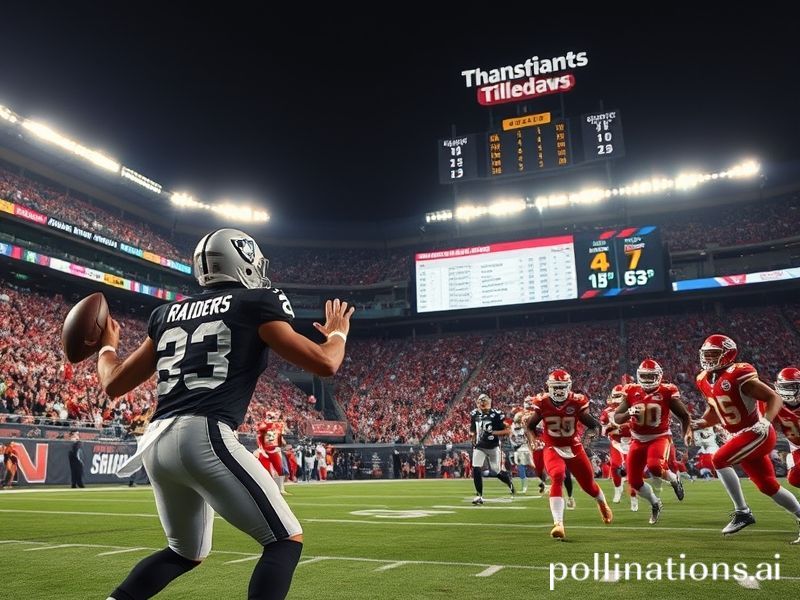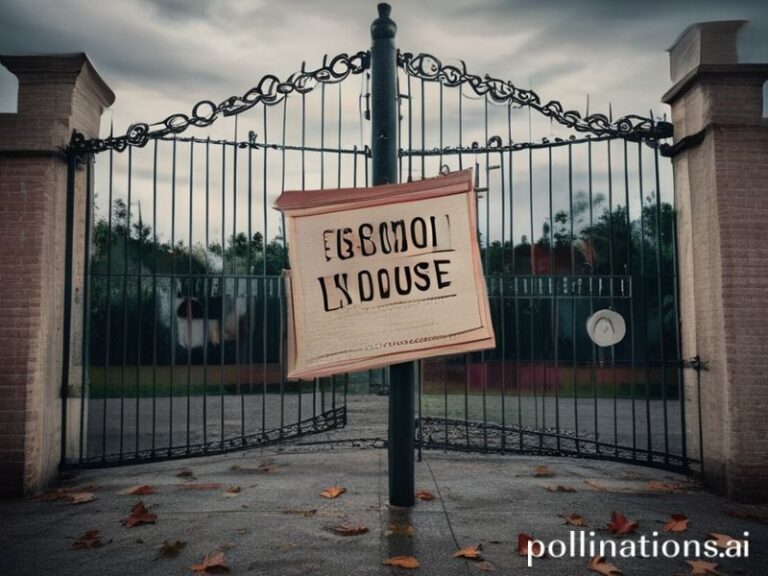AFC West: How Four American Cities Became the World’s Unlikeliest Soft-Power Cartel
Kansas City, Denver, Las Vegas, Los Angeles—four cities whose names conjure very different flavors of late-stage capitalism, now welded together by a division whose acronym sounds suspiciously like a Swiss bank routing code. Welcome to the AFC West, a quarterly demonstration that even in the age of global supply-chain anxiety, Americans still find time to weaponize regional identity through shoulder pads and play-action passes.
To the uninitiated foreign observer, the division resembles a geopolitical Rorschach test. Kansas City, home of the defending champions, exports Patrick Mahomes’ no-look passes much the way it once shipped beef: flash-frozen, perfectly branded, and destined for worldwide consumption. Meanwhile, Denver offers thin air, legal cannabis, and a quarterback carousel so frantic it could pass for a Davos panel on rotating leadership. Las Vegas provides the obligatory Sin City backdrop—because nothing says “family entertainment” quite like 65,000 people day-drinking in a desert sarcophagus shaped like a spaceship. And Los Angeles, ever the reluctant host, pretends to care whenever the Chargers’ tiny fan base can successfully parallel-park near SoFi Stadium.
The international stakes, if one squints hard enough through the smog and moral haze, are surprisingly tangible. The NFL’s European experiment has already colonized London, Munich, and soon São Paulo—cities now forced to memorize the difference between Travis and Jason Kelce, as if the Treaty of Westphalia now contained a clause about tight-end eligibility. AFC West teams are frequent flyers on these imperial tours, functioning less like sports franchises and more like soft-power aircraft carriers with luxury boxes. Mahomes’ jersey sales in Tokyo alone probably offset the Chiefs’ carbon footprint, though nobody in the league office is rushing to publish that ledger.
Then there is the matter of capital flows. Consider the Raiders: once Oakland’s problem, now Nevada’s tax incentive. The franchise’s relocation reads like an IMF restructuring program—public money up front, vague promises of trickle-down prosperity, and a new stadium that looks like a Bond villain’s panic room. Similarly, the Chargers’ move from San Diego to Los Angeles was less a migration than a hostile urban takeover, the sporting equivalent of Airbnb gentrification: same couch, suddenly 400 % more expensive, and someone else’s logo on the throw pillows.
Globally, the AFC West functions as a miniature petro-state confederation. Kansas City’s barbecue smoke drifts north to Canada; Denver’s fracking royalties underwrite another edge rusher; Las Vegas siphons Macau’s whale gamblers; and Los Angeles sells the broadcast rights back to Beijing at a tidy markup. Each Sunday, satellite dishes from Lagos to Lahore tune in, providing a fleeting sense of shared spectacle while the planet quietly overheats. Viewers abroad may not grasp the intricacies of Cover-3 versus Tampa-2, but they intuitively understand the universal language of billionaires arguing over salary caps.
Of course, the division’s most profound export is existential dread. Every offseason, fans in all four markets engage in ritualistic hope-purchasing—free-agency splurges, draft-day delusions, training-camp propaganda—only to discover that hope, like subprime mortgages, is best bundled and resold before reality sets in. Broncos Country has been refinancing the same 2015 championship memory longer than some European nations have used the euro. The Raiders’ commitment to chaos theory would make a Greek finance minister blush. And the Chargers remain the only franchise whose medical staff is certified in both sports medicine and disaster triage.
By season’s end, one city will parade down streets lined with adoring subjects; the other three will mutter darkly about officiating conspiracies and cap space, a cycle as predictable as global commodity prices. Yet the show rolls on, beamed to aircraft carriers in the South China Sea and pop-up watch parties in Reykjavik basements. Somewhere in a Zurich boardroom, an actuary quietly adds “AFC West ratings volatility” to a risk-assessment spreadsheet alongside copper futures and Ukrainian grain shipments.
So toast the absurdity, dear international reader: we are all, in some small way, season-ticket holders now. Just remember that in the AFC West—as in life—the house always wins, the quarterback always gets hurt, and the broadcast never quite compensates for the existential hangover. Cheers.







